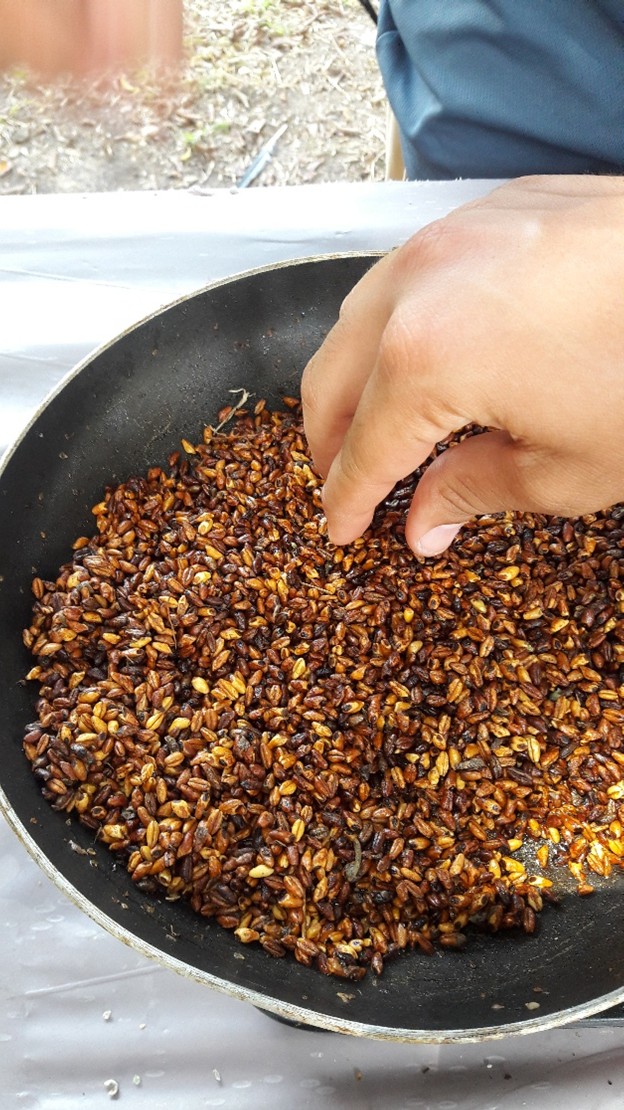Shavuot with a Taste of Royalty: A Journey Through King David’s Ancient Dish
Shavuot is widely known today as the holiday of dairy foods, but originally, it was the festival of the wheat harvest in the Land of Israel. Barley ripens around Passover, while wheat matures about 50 days later — precisely in time for Shavuot, one of the three pilgrimage festivals in the Bible. In ancient times, pilgrims would ascend to Jerusalem and bring the first fruits of the wheat harvest to the Temple.
On Shavuot, it is also customary to read the Book of Ruth — a moving story set in the fields of Bethlehem, during the transition from the barley harvest to the wheat harvest. Ruth, a Moabite widow, returns with her mother-in-law Naomi to Bethlehem. As a poor woman, she goes out to glean barley in the field of Boaz — a relative of Naomi. Boaz notices her and invites her to share a morning meal with the harvesters, offering her a simple yet symbolic food: kali — roasted grain.
This encounter led to the marriage of Ruth and Boaz, and to the birth of their son Obed — the father of Jesse and grandfather of King David.
The Book of Ruth recounts:
“A son has been born to Naomi; they named him Obed — he was the father of Jesse, the father of David.” (Ruth 4:17)
Though the child was born to Ruth, the verse attributes his birth to Naomi — symbolizing renewal, hope, and redemption for a family that had experienced great loss. Ruth and Boaz are traditionally considered King David’s great-grandparents — a key figure in Jewish history and biblical heritage.
According to Jewish tradition, King David was both born and died on Shavuot. Many make a pilgrimage on this day to his traditional burial site on Mount Zion in Jerusalem — a spiritually rich site open to visitors year-round.
Kali, this humble and ancient dish, accompanied David through pivotal moments in his life:
- Abigail, wife of Nabal the Carmelite (and later David’s wife), brought him kali as he fled from Saul: “Then Abigail hurried and took... five seahs of roasted grain…”(1 Samuel 25:18)
- David himself brought kali to his brothers at the battlefield, where he encountered and defeated Goliath: “Then Jesse said to his son David, ‘Take now for your brothers an ephah of this roasted grain…" (1 Samuel 17:17)
- David’s friends from beyond the Jordan brought him kali while he was on the run from his son Absalom:“…and wheat, barley, flour, roasted grain… to eat — for they said, ‘The people are hungry, tired, and thirsty in the wilderness." (2 Samuel 17:28)
Three thousand years later, kali continues to be part of Jewish life around the world, preserving the taste of ancient tradition.
In Yemenite Jewish communities, kali is traditionally served at the start of the Sabbath meal, alongside legumes and nuts. Among Ethiopian Jews, kali made from wheat or barley served as a staple food during their long journey to Israel — a handful was enough for an entire day. Other Jewish communities would roast grains during the harvest season and incorporate them into holiday meals — in memory of abundance and blessing.
Thus, a simple dish from biblical times has been preserved in Jewish kitchens through the generations — a living symbol of connection between land, people, and faith.

Traditional Kali, Photo credit: Tova Dikshtain
If you, too, want to experience the traditional taste from King David’s family table — here is the recipe for kali:
Traditional Kali Recipe:
- 2 cups clean wheat grains
- 1 teaspoon salt
- 4 cups boiling water
- 1 tablespoon olive oil
Preparation:
- Rinse the wheat, then cook with boiling water and salt for about 3 minutes.
- Drain and let dry for about an hour.
- Roast the grains in a pan with olive oil over high heat, stirring constantly until golden brown.
- Serve hot or cold. You may add a pinch of salt.
One dish, many stories — wishing you a joyful and flavorful Shavuot!